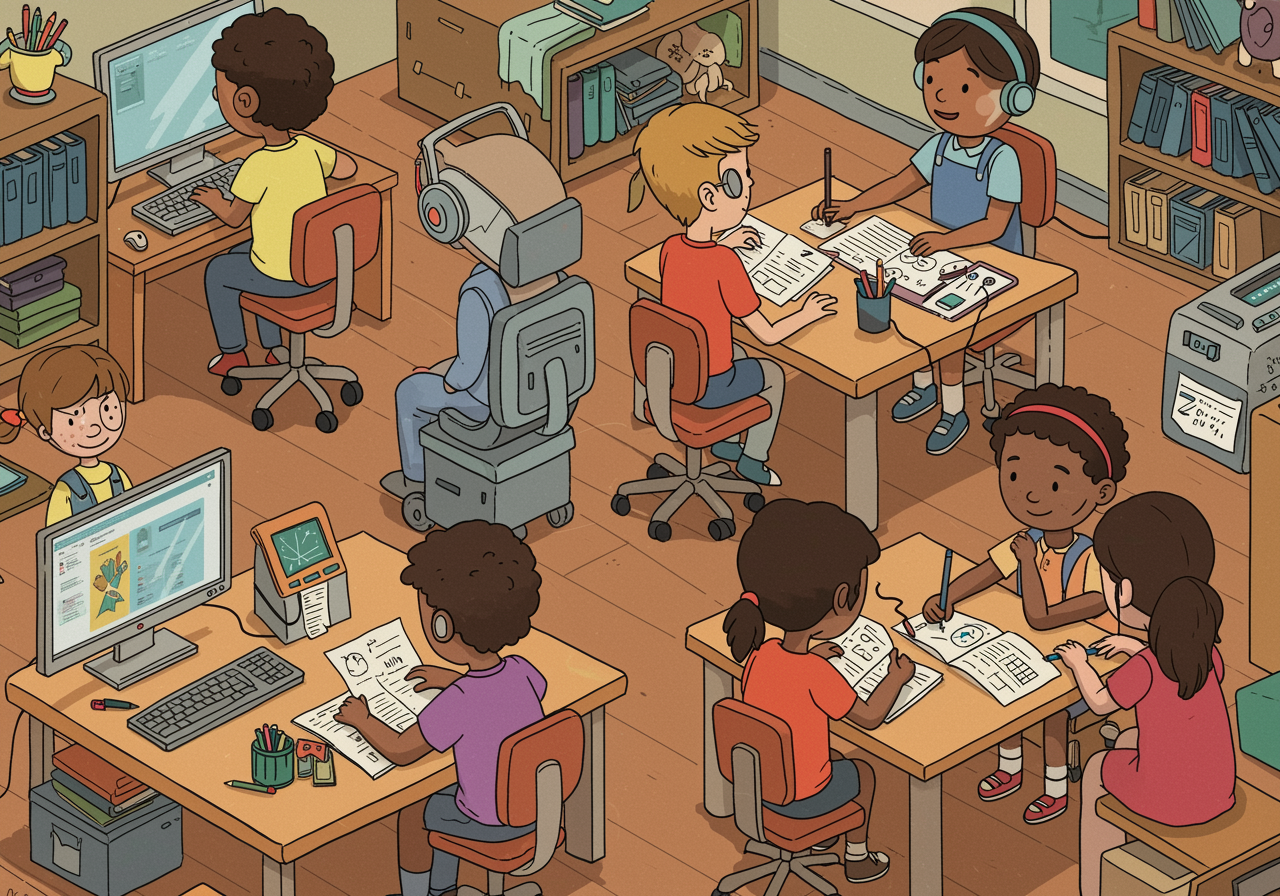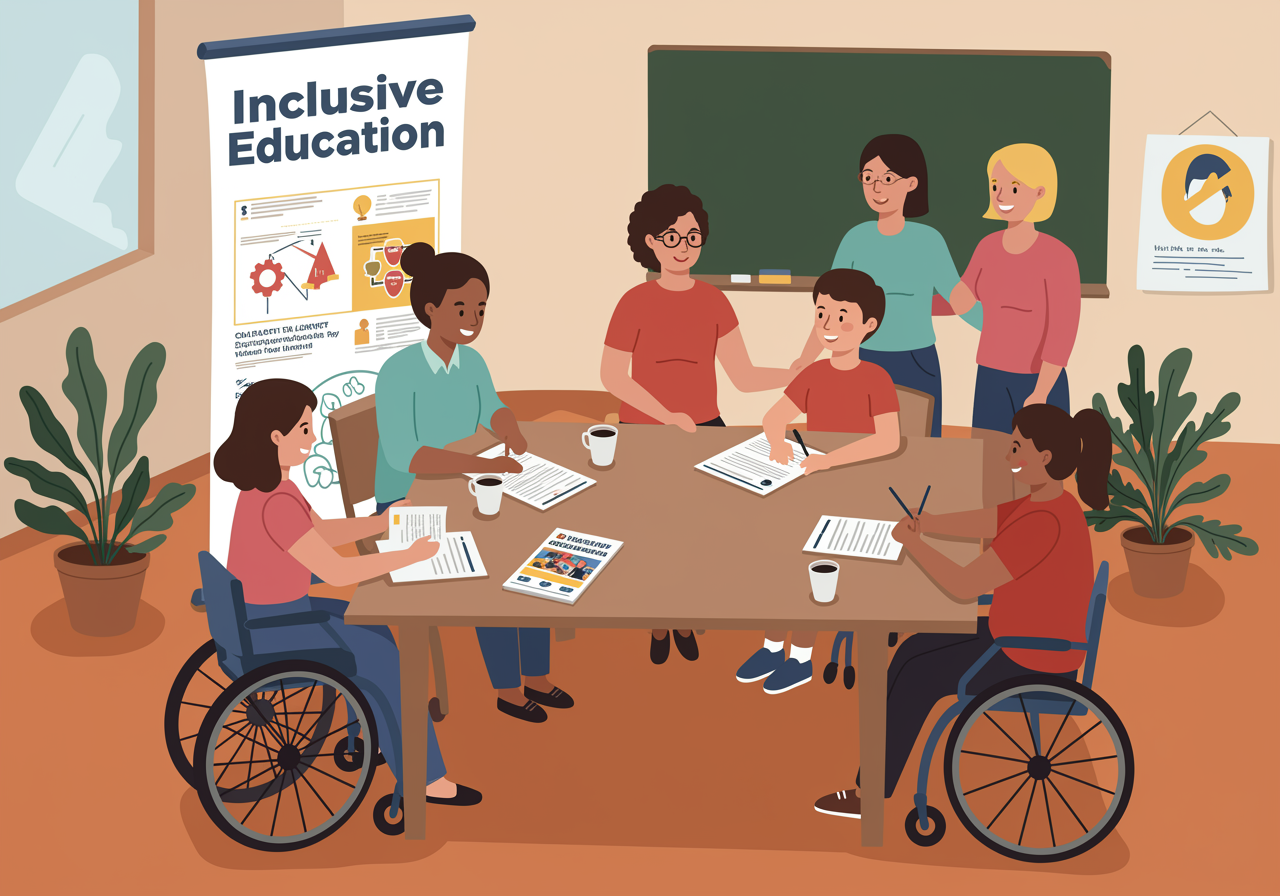Champions in Action: How Communities Fight for Every Student’s Success
Discover how ordinary people become extraordinary advocates for students who learn differently
Explore the amazing ways communities band together to make sure every student gets the tools they need to shine, no matter how their brain works.
Overview
Every student learns differently – some need extra time on tests, others learn best by moving around, and some use special technology to read or write. When schools don't have the right resources, communities step up like superheroes! Parents, teachers, and neighbors work together to make sure every kid gets what they need to succeed. Think of it like a team sport where everyone's goal is helping students reach their full potential, no matter what challenges they face.

Understand in 30 Seconds
Get up to speed quickly
- What Are Learning Differences?: Some students have brains that work differently – like dyslexia (trouble reading), ADHD (trouble focusing), or autism (processing the world differently). These aren't flaws, just different ways of thinking!
- What Do Students Need?: Different learners might need special software, extra time on tests, quiet spaces, or teachers trained in specific methods. It's like having the right equipment for different sports.
- How Do Communities Help?: Parents form groups, attend school board meetings, raise money for equipment, and push for new laws. They're like a team working together for change.
- Why Does It Matter?: When students get the right support, they can achieve amazing things! It's about making sure everyone has a fair chance to succeed and show their talents.
Real Life Scenario
Situations you can relate to
Imagine your friend Maya is brilliant at solving problems but struggles to read because of dyslexia. She falls behind in class because textbooks are hard for her, even though she understands the concepts perfectly. Maya's mom starts talking to other parents and discovers many kids need similar help. Together, they research text-to-speech software and present their findings to the school board. They organize fundraisers, write letters, and even bring Maya to share her story. After months of teamwork, the school gets new technology that helps Maya and dozens of other students succeed. What started with one concerned parent became a community movement that changed everything!

Role Play
Spark a conversation with “what if” scenarios
What if you were a parent whose child needed special accommodations at school?
- Role play: Take turns being the parent researching solutions and the school administrator listening to concerns. Practice explaining needs clearly and finding compromises that work for everyone.
What if you were organizing a community meeting about inclusive education?
- Role play: One person plays the meeting organizer, another plays different community members (parents, teachers, students). Practice listening to different viewpoints and finding common ground.
What if you were a student advocating for yourself at school?
- Role play: Practice explaining your learning style and what helps you succeed. One person plays the student, another plays a teacher or principal learning how to better support them.
FAQs
Frequently asked questions people want to know
What's the difference between accommodations and modifications?
Accommodations change HOW a student learns (like using a computer instead of writing by hand), while modifications change WHAT they learn (like shorter assignments). Both help students succeed in their own way.
How do parents know what their child needs?
Through testing by specialists, observing how their child learns best, talking to teachers, and sometimes trial and error. It's like being a detective figuring out the best learning strategy.
Can students with learning differences go to regular schools?
Absolutely! Most students with learning differences attend regular schools with extra support. It's called inclusion, and it benefits everyone by creating more understanding and diverse classrooms.
Examples in the Wild
See how this works day to day
- In 2023, parents in Fairfax County, Virginia successfully advocated for universal design classrooms that benefit all learners, not just those with diagnosed differences. (Education Week)
- Students with dyslexia in Texas pushed for state legislation requiring all teachers to receive training in reading instruction methods that help struggling readers. (The Texas Tribune)
- A group of autism advocates in California created sensory-friendly spaces in schools after organizing community awareness campaigns and fundraising efforts. (Autism Society of California)
- High school students in Chicago formed their own advocacy group to push for mental health resources and flexible testing accommodations in their district. (Chicago Public Schools News)
In Summary
What you should know before you start
- Communities become powerful advocates when they work together to support students with different learning needs
- Advocacy takes many forms: attending meetings, fundraising, sharing stories, and pushing for policy changes
- Students with learning differences can achieve incredible things when they get the right support and tools
- Everyone benefits when schools become more inclusive and understand that there are many ways to be smart
Pro-tip for Parents
You got this!
If your child seems frustrated with this topic or defensive about learning differences, remind them that everyone's brain works differently – some people are great at math, others at art, others at understanding emotions. The goal isn't to 'fix' anyone, but to give everyone the tools they need to shine. Share examples of successful people with learning differences like Richard Branson (dyslexia) or Temple Grandin (autism) to show how different thinking can be a superpower.

Keep an Eye Out For
Find these examples in everyday life
- School board meetings in your community where education policies are discussed
- News stories about students achieving success with new accommodations or technology
- Fundraising events for adaptive technology or inclusive programs at local schools
- Student-led advocacy efforts or awareness campaigns about learning differences
- New laws or policies being proposed to support inclusive education in your state
Explore Beyond
Look up these related research topics
- How technology is revolutionizing accessibility in education
- The history of disability rights and inclusion in schools
- Different types of learning differences and how they affect students
- How universal design benefits everyone, not just people with disabilities
- The role of peer support and student advocacy in creating inclusive schools